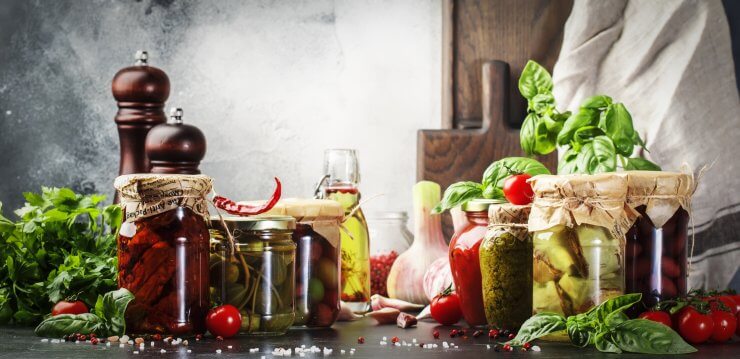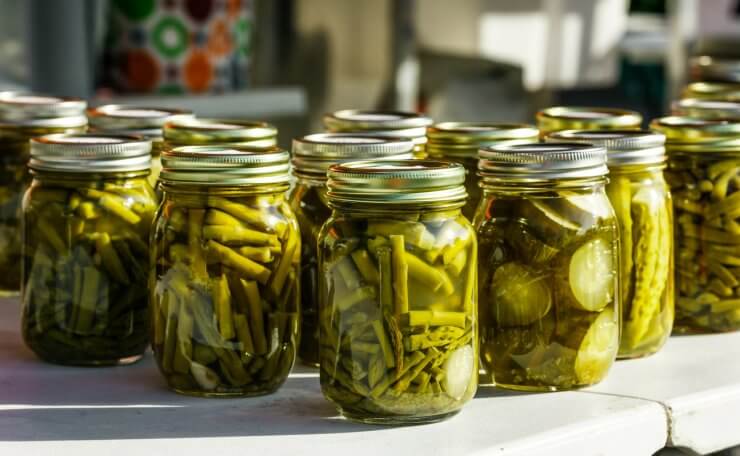
I get it. You worked hard on preserving those fresh garden veggies, and you’re looking forward to enjoying them on a cold, dark winter evening. You pull a glass jar from your pantry, and you notice the signs of food spoilage.
It’s disappointing. If the spoilage isn’t too evident, you might even be tempted to ignore it and enjoy those veggies anyway. And, no, I’m not pointing a finger at you specifically. Anyone, including myself, who has preserved vegetables has gone through this.
But if there’s one rule in food safety, it’s this: When in doubt, toss it out.
Now then, what are those signs? And what does food spoilage mean, exactly? And will it “really” hurt you?
Discover 7 top tips for growing, harvesting, and enjoying tomatoes from your home garden—when you access the FREE guide The Best Way to Grow Tomatoes, right now!

The 7 signs of food spoilage you can’t ignore
Before we run through some of the signs of food spoilage, let’s talk definitions. The USDA has a specific definition of food spoilage:
“Foods that deteriorate and develop unpleasant odors, tastes, and textures are spoiled. Spoilage bacteria can cause fruits and vegetables to get mushy or slimy, or meat to develop a bad odor. Most people would not choose to eat spoiled food.”
However, the National Center for Home Food Preservation (NCHFP) at the University of Georgia points out that some spoiled foods may show “very little evidence” of contamination.
For our purposes here, I’d like to use the broader definition. Not that I want to argue with the USDA, but when it comes to food safety, I’d rather go overboard than have someone get sick. Still, we can start with some of the obvious signs that the USDA mentions.
1. Mushy or slimy. Pretty obvious, right? If you open your jar of carrots that you preserved a few months back, and they’re slimy as a jack-o-lantern two weeks past Halloween, it’s safe to assume they are spoiled.
2. Offensive odor. Again, this is one of the more obvious signs of food spoilage. If your nose crinkles and your eyes tear up when you open a jar of preserved vegetables, there’s a good chance you need to get rid of it.
3. Tastes bad. Do NOT taste suspect food to figure out if it is spoiled. However, if you don’t notice any other signs of food spoilage and take a bite, an “off” taste could indicate that your food has taken a turn for the worse.
4. Mold. Yes, I know many of us were taught that we can just scrape off the moldy part and still enjoy the rest of the food. But like many things we used to believe (coffee will stunt your growth or Elvis is still alive), it’s just not true. Mold can permeate your preserved vegetables far beyond what you can see on the surface.
5. Leaking or broken seals. It’s easy to understand why this would be an indication that your preserved veggies have gone bad. Leaks or broken seals mean that bacteria has had every chance to infiltrate your jar. Since bacteria such as Salmonella and E. coli proliferate in temperatures above 40 degrees Fahrenheit, and since these bacteria don’t have a taste or smell, the only option here is to discard that jar of vegetables.
6. Bubbles and spurts. Bubbles are bad. Spurting liquid when you open a jar is bad. The exception here is that in the first day or two after you can your vegetables, there may be some settling.
7. Power failure. Many preserved vegetables are canned or dried, but you can also preserve vegetables in the freezer. Unfortunately, a prolonged power failure could result in thawing and potential contamination.
A word about Clostridium botulinum
One of the problems about sticking to the more obvious signs of food spoilage like mold or sliminess is that those signs aren’t always there.
Bessie E. McClelland, extension nutritionist at Montana State College, put it succinctly:
“The food may be soft or slimy or discolored and the liquid cloudy or it may not show any of these signs, not even an odor. Death has resulted from such food that showed no signs of spoilage.”
Though she wrote that in 1945, not much has changed. The USDA currently states that “Botulism is a deadly food poisoning” that may appear in incorrectly processed canned goods. They also state that contaminated foods can taste and smell normal.
It’s also important to note that, according to the National Center for Home Food Preservation and the CDC, you should never taste suspect food to determine whether or not it is safe. The CDC explicitly states:
“You cannot see, smell, or taste botulinum toxin – but taking even a small taste of food containing this toxin can be deadly.”
Both sources also suggest using rubber gloves and taking extensive precautions when handling contaminated foods as the toxin can enter your system through the skin.
What does this all mean? If you do your own canning, be sure to follow the guidelines laid out by the NCHFP. If your preserved vegetables show any of the above signs of food spoilage, proceed as if it is contaminated.
Now that I’ve stressed you out, it’s worth mentioning that preserving foods from your garden can be fun and a great way to hold onto those delicious fresh veggies well into the winter. Just follow a few basic food safety guidelines and you should be fine.
Have you had preserved food go bad? How did you notice?
Discover 7 top tips for growing, harvesting, and enjoying tomatoes from your home garden—when you access the FREE guide The Best Way to Grow Tomatoes, right now!




